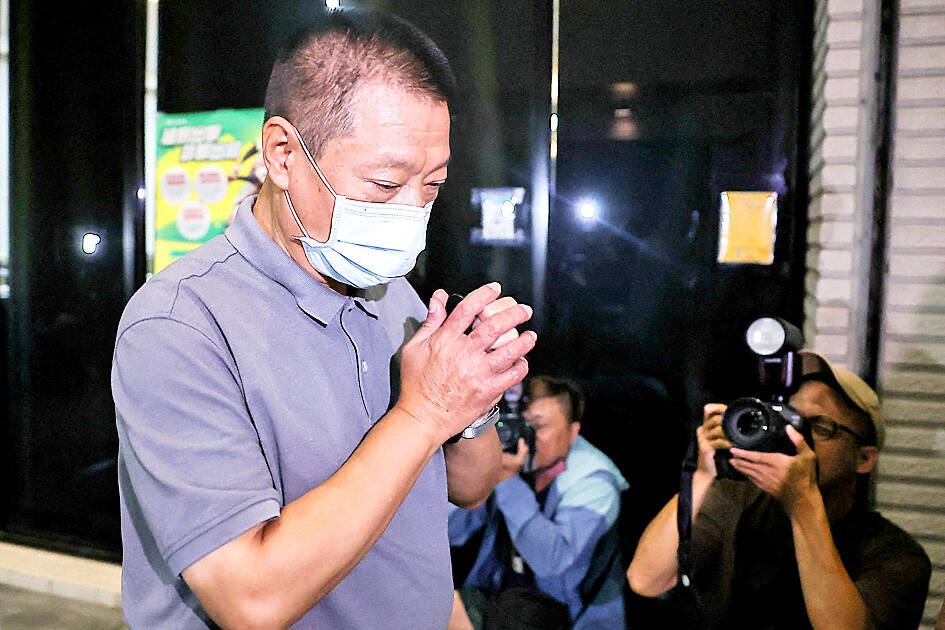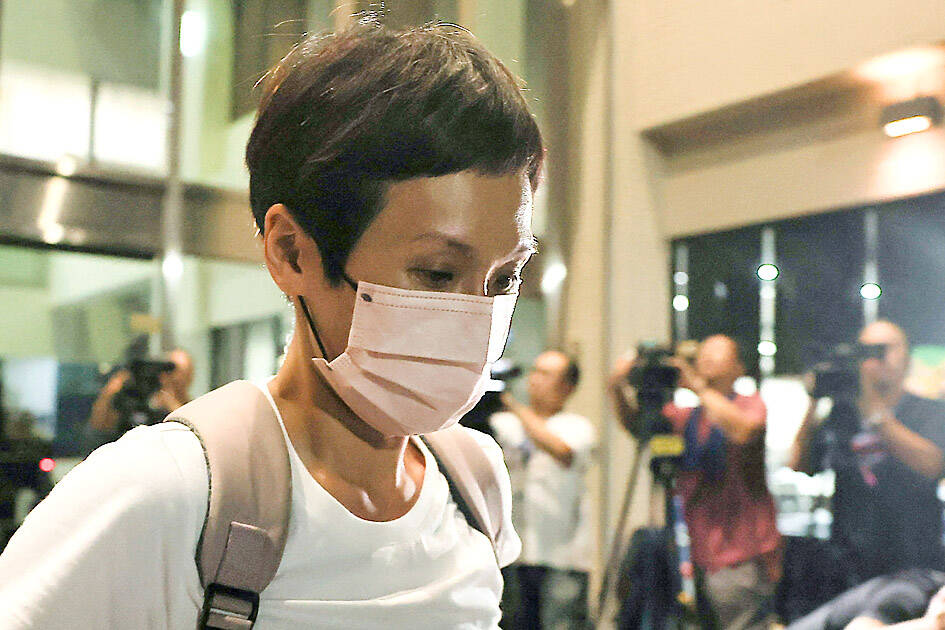Authorities in Taiwan and Bulgaria yesterday denied involvement in the supply chain of thousands of pagers that detonated on Tuesday in Lebanon in a deadly blow to Hezbollah.
Tuesday’s attack, and another on Wednesday involving exploding hand-held radios used by Hezbollah, together killed 37 people and wounded about 3,000 in Lebanon.
How or when the pagers were weaponized and remotely detonated remains a public mystery and the hunt for answers has involved Taiwan, Bulgaria, Norway and Romania.

Photo: Ann Wang, Reuters
Security sources said that Israel was responsible for the pager explosions that raised the stakes in a growing conflict between the two sides. Israel has not directly commented on the attacks.
New Taipei City-based Gold Apollo (金阿波羅通信) this week said it did not manufacture the devices used in the attack and Budapest-based BAC Consulting KFT, to which the pagers were traced, has a license to use its brand.
“The components are [mainly] low-end IC and batteries,” Minister of Economic Affairs J.W. Kuo (郭智輝) said yesterday.

Photo: Ann Wang, Reuters
When asked whether the parts in the pagers that exploded were made in Taiwan, Kuo said: “I can say with certainty they were not made in Taiwan,” adding that the case is being investigated by judicial authorities.
In response to media queries, Minister of Foreign Affairs Lin Chia-lung (林佳龍) answered “no” when asked if he had met with the de facto Israeli ambassador to express concern about the case.
“We are asking our missions abroad to raise their security awareness and will exchange relevant information with other countries,” Lin said.
Premier Cho Jung-tai (卓榮泰) also said that Gold Apollo “and Taiwan did not directly export pagers to Lebanon.”
Bulgaria also became a focal point for investigations on Thursday after local media reported that Sofia-based Norta Global Ltd was involved in selling the pagers.
Bulgaria’s state security agency DANS yesterday said that it had “indisputably established” that no pagers used in the Lebanon attack were imported to, exported from, or made in Bulgaria.
Neither Norta nor its Norwegian owner had traded, sold or bought the pagers within Bulgaria’s jurisdiction, DANS said.
As Taiwanese authorities look into any potential link between its sprawling global tech supply chains and the devices used in the attacks in Lebanon, Gold Apollo president and founder Hsu Ching-kuang (許清光) was questioned by prosecutors late into the night on Thursday then released.
Another person also at the prosecutors’ office was a woman surnamed Wu (吳), a representative connected to BAC, who had set up a company based in Taipei called Apollo Systems.
She did not speak to reporters as she left late on Thursday.
A spokesperson for the Shilin District Prosecutors’ Office said that it had questioned two people as witnesses and was given consent to conduct searches of their firms’ four locations in Taiwan as part of its investigation.
“We’ll seek to determine if there was any possible involvement of these Taiwanese companies as soon as possible, to ensure the safety of the country and its people,” the spokesperson said.
Iran-aligned Hezbollah has vowed to retaliate against Israel, which has not claimed responsibility for the detonations.
The two sides have been engaged in cross-border warfare since the conflict in Gaza erupted in October last year.
Additional reporting by AFP

SECURITY: As China is ‘reshaping’ Hong Kong’s population, Taiwan must raise the eligibility threshold for applications from Hong Kongers, Chiu Chui-cheng said When Hong Kong and Macau citizens apply for residency in Taiwan, it would be under a new category that includes a “national security observation period,” Mainland Affairs Council (MAC) Minister Chiu Chui-cheng (邱垂正) said yesterday. President William Lai (賴清德) on March 13 announced 17 strategies to counter China’s aggression toward Taiwan, including incorporating national security considerations into the review process for residency applications from Hong Kong and Macau citizens. The situation in Hong Kong is constantly changing, Chiu said to media yesterday on the sidelines of the Taipei Technology Run hosted by the Taipei Neihu Technology Park Development Association. With

CARROT AND STICK: While unrelenting in its military threats, China attracted nearly 40,000 Taiwanese to over 400 business events last year Nearly 40,000 Taiwanese last year joined industry events in China, such as conferences and trade fairs, supported by the Chinese government, a study showed yesterday, as Beijing ramps up a charm offensive toward Taipei alongside military pressure. China has long taken a carrot-and-stick approach to Taiwan, threatening it with the prospect of military action while reaching out to those it believes are amenable to Beijing’s point of view. Taiwanese security officials are wary of what they see as Beijing’s influence campaigns to sway public opinion after Taipei and Beijing gradually resumed travel links halted by the COVID-19 pandemic, but the scale of

A US Marine Corps regiment equipped with Naval Strike Missiles (NSM) is set to participate in the upcoming Balikatan 25 exercise in the Luzon Strait, marking the system’s first-ever deployment in the Philippines. US and Philippine officials have separately confirmed that the Navy Marine Expeditionary Ship Interdiction System (NMESIS) — the mobile launch platform for the Naval Strike Missile — would take part in the joint exercise. The missiles are being deployed to “a strategic first island chain chokepoint” in the waters between Taiwan proper and the Philippines, US-based Naval News reported. “The Luzon Strait and Bashi Channel represent a critical access

Pope Francis is be laid to rest on Saturday after lying in state for three days in St Peter’s Basilica, where the faithful are expected to flock to pay their respects to history’s first Latin American pontiff. The cardinals met yesterday in the Vatican’s synod hall to chart the next steps before a conclave begins to choose Francis’ successor, as condolences poured in from around the world. According to current norms, the conclave must begin between May 5 and 10. The cardinals set the funeral for Saturday at 10am in St Peter’s Square, to be celebrated by the dean of the College